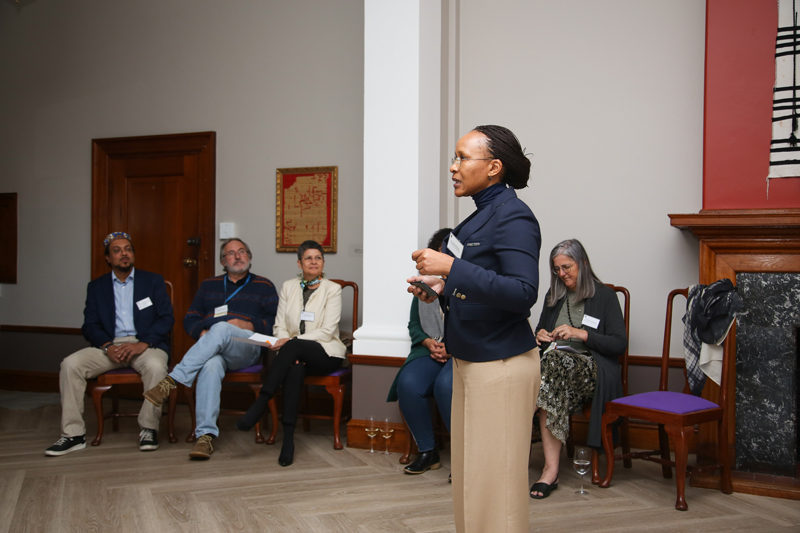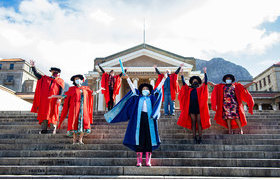UCT introduces new ATAP cohort
10 May 2023 | Story Stephen Langtry. Photo Je’nine May. Read time 6 min.
On 3 May, the University of Cape Town (UCT) hosted a welcome reception for the new cohort of awardees in the Accelerated Transformation of the Academic Programme (ATAP). The event, which took place at the Ben Beinart Room in the Otto Beit Building, a beautiful and historic venue located on UCT’s upper campus, provided an opportunity to celebrate the achievements of the programme and to welcome the new recipients.
ATAP is coordinated and run through the Office for Postgraduate Studies (OPGS), located within the Research Office at UCT. The main aim of the programme is to attract and build a pipeline of
high-performing black South African postgraduates, including supervised research master’s and doctoral students, as well as postdoctoral fellows who have an interest in and show a commitment to actively pursuing academic careers through postgraduate study into early-career positions at UCT, or at other institutions.
ATAP was established in response to the underrepresentation of black South African academics in the higher education sector in South Africa. The programme offers scholarship and fellowship funding, as well as targeted capacity development support mechanisms to prepare students for academic careers.
The support and development offerings provided by the programme include appropriate training for teaching, research, and engaged scholarship skills, as well as mentorship, integration into existing programmes, research writing retreats, and support for research and conference travel. This comprehensive support system aims to provide students with the tools and resources necessary to succeed in their academic careers.
Three cohorts
The programme was established in October 2021. In 2023, the programme admitted three master’s students, four doctoral candidates, and one postdoctoral research fellow. Adding to the 13 recipients in cohort one (2021) and 11 recipients in cohort two (2022).
“We are establishing a career path for the next generation of scholars.”
This was the first occasion where awardees from the three ATAP cohorts were together in the same room. Guests at the event were welcomed by Dr Linda Mtwisha, the executive director for Research, who spoke about the importance of ATAP in creating a more diverse and inclusive academic community at UCT. “This is a critically important initiative in that we are establishing a career path for the next generation of scholars,” Dr Mtwisha said.
She emphasised the need to support and mentor young black South Africans who are interested in pursuing academic careers and noted that ATAP provides a crucial pipeline for achieving this goal.
“Some of us might be excited about the funding part of [ATAP] … but equally important is the nurturing and capacity development,” said Mtwisha. The programme has already had a significant impact on the academic community at UCT, and the welcome reception provided an opportunity to celebrate this achievement. The event was attended by senior UCT staff, including Deputy
Vice-Chancellor for Research and Internationalisation Professor Sue Harrison, research supervisors of the new ATAP awardees, as well as members of the Postgraduate Funding Office and OPGS, along with the ATAP awardees.
Shared experiences
Professor Peter Meissner, the director of Postgraduate Studies and Research Development, also spoke at the event, highlighting the impact of the programme on the research community at UCT. “This is a significant investment,” Professor Meissner said. He noted that ATAP had already contributed to a more diverse and inclusive research environment at the university. Meissner emphasised the need to continue to support and encourage young South Africans to pursue academic careers.
“Everyone’s journey is different.”
He acknowledged the various people who worked to make ATAP a reality, including the deputy
vice-chancellors, colleagues in the Office for Inclusivity & Change (OIC), and the OPGS. Janine Carlse, the programme manager for ATAP, introduced the new 2023 cohort:
- Wade van Zyl – master’s student in Geological Sciences
- Melisa Zulu – master’s student in Psychology
- Zenaéca Singh – master’s student in Fine Arts
- Taryn Golding – doctoral candidate in Chemistry
- Khomotso Motene – doctoral candidate in Chemical Engineering
- Siphokazi Hlalukana – doctoral candidate in Tax and Finance
- Nina Steenkamp – doctoral candidate in Psychology
- Shaine Raseale – postdoctoral research fellow in Chemical Engineering
The event also provided an opportunity for ATAP recipients to share their experiences and aspirations for the future.
Kyllen Dilsook, a doctoral candidate in the Department of Chemistry, who also completed his master’s with the support of ATAP, spoke about his experiences as one of the members of the first cohort of ATAP recipients. “Journeys are quite different across the faculties,” he said. “You have to remember that everyone’s journey is different and to help you along that journey we have our mentors and other people in this room. Take advantage of the opportunities that are afforded to you.”
Dr Nicole Dames, a postdoctoral research fellow in the Biological Sciences department, said that it was a huge compliment to be part of the programme, and noted that her experiences as an ATAP recipient have been very rewarding.
Both expressed their gratitude for the opportunities provided by ATAP, and their excitement at the prospect of being able to contribute to the academic community at UCT and beyond.
 This work is licensed under a Creative Commons Attribution-NoDerivatives 4.0 International License.
This work is licensed under a Creative Commons Attribution-NoDerivatives 4.0 International License.
Please view the republishing articles page for more information.










